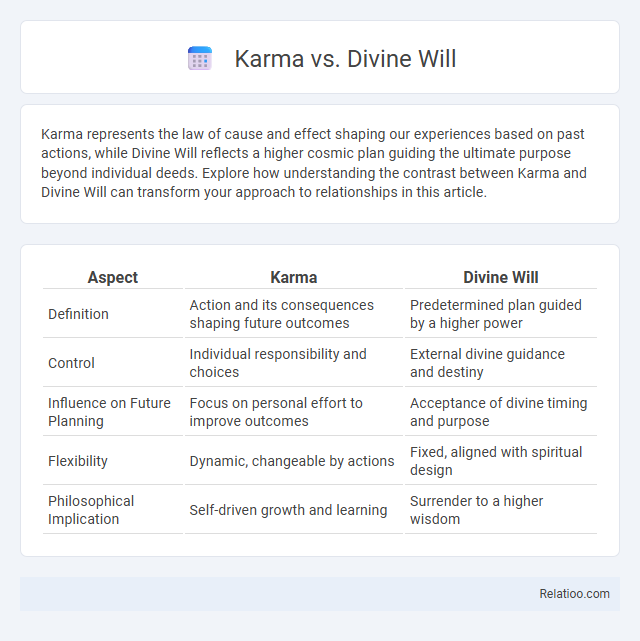Karma represents the law of cause and effect shaping our experiences based on past actions, while Divine Will reflects a higher cosmic plan guiding the ultimate purpose beyond individual deeds. Explore how understanding the contrast between Karma and Divine Will can transform your approach to relationships in this article.
Table of Comparison
| Aspect | Karma | Divine Will |
|---|---|---|
| Definition | Action and its consequences shaping future outcomes | Predetermined plan guided by a higher power |
| Control | Individual responsibility and choices | External divine guidance and destiny |
| Influence on Future Planning | Focus on personal effort to improve outcomes | Acceptance of divine timing and purpose |
| Flexibility | Dynamic, changeable by actions | Fixed, aligned with spiritual design |
| Philosophical Implication | Self-driven growth and learning | Surrender to a higher wisdom |
Introduction to Karma and Divine Will
Karma represents the universal principle of cause and effect, where Your actions directly influence future outcomes and spiritual growth. Divine Will refers to a higher power's purposeful plan that guides the course of events beyond human control or understanding. Both concepts play crucial roles in shaping beliefs around destiny, responsibility, and the interconnectedness of life.
Understanding the Concept of Karma
Karma is a fundamental spiritual principle emphasizing that every action you take generates corresponding consequences, shaping your future experiences and spiritual growth. Unlike Divine Will, which implies a predetermined plan governed by a higher power, karma operates as a law of cause and effect within the universe, reflecting ethical accountability and personal responsibility. Understanding karma deepens your spiritual belief by highlighting how intentional choices influence your life's path and moral development.
Exploring the Meaning of Divine Will
Divine Will represents a transcendent and purposeful force guiding the universe beyond human understanding, often interpreted as the intentional design or plan of a higher power. Unlike Karma, which centers on cause and effect driven by individual actions, Divine Will emphasizes submission and alignment with a predetermined cosmic order. Spiritual beliefs explore Divine Will as the ultimate source of meaning and moral direction, shaping human destiny through faith and divine intervention.
Historical Perspectives on Karma and Divine Will
Historical perspectives on Karma trace back to ancient Indian religions such as Hinduism, Buddhism, and Jainism, where it is understood as a moral law of cause and effect influencing future rebirths. Divine Will, rooted in monotheistic traditions like Christianity, Islam, and Judaism, represents the omnipotent decree of a supreme deity guiding human destiny and cosmic order. These contrasting frameworks reflect divergent worldviews on fate and moral responsibility, with Karma emphasizing individual action and consequences, while Divine Will underscores submission to a higher, often inscrutable, power.
Key Differences Between Karma and Divine Will
Karma is primarily a concept rooted in actions and their consequences, emphasizing personal responsibility where every deed influences future experiences within the cycle of rebirth. Divine will refers to the belief that a supreme being or cosmic plan dictates outcomes beyond individual control, highlighting surrender to a higher power's purpose. Spiritual belief encompasses a broader spectrum, integrating elements like karma and divine will while addressing inner faith, moral values, and the quest for meaning beyond empirical existence.
Interplay Between Karma and Divine Will in Human Life
Karma represents the law of cause and effect, where Your actions directly influence future outcomes, while Divine Will embodies a higher cosmic plan that transcends individual deeds. The interplay between Karma and Divine Will shapes human experiences by balancing personal responsibility with a greater spiritual purpose. Understanding this dynamic helps align Your life choices with divine guidance, fostering growth within spiritual belief systems.
Karma vs Divine Will in Major Religions
Karma and Divine Will represent contrasting forces influencing human destiny across major religions, with Karma emphasizing cause and effect through individual actions, primarily found in Hinduism, Buddhism, and Jainism, while Divine Will highlights the sovereignty of a higher power determining fate, central to Christianity, Islam, and Judaism. Your understanding of these concepts can shape how you interpret moral responsibility and spiritual accountability within different faith traditions. This distinction reflects the broader theological debate between self-driven moral consequences and predestined divine plans.
The Role of Free Will in Karma and Divine Will
Free will plays a crucial role in karma, as individual choices directly influence future consequences and soul evolution according to many spiritual traditions. In contrast, divine will often implies a predetermined plan or cosmic order, where human freedom operates within the boundaries set by a higher power's intentions. Spiritual beliefs generally recognize a dynamic interplay between free will and divine will, suggesting that personal decisions can align with or diverge from divine purpose, impacting spiritual growth and karmic outcomes.
Practical Implications for Daily Living
Karma emphasizes personal responsibility by encouraging mindful actions and ethical decisions, leading to positive or negative consequences that shape daily experiences. Divine Will promotes acceptance and trust in a higher power's plan, fostering resilience and patience during challenges or uncertainties. Spiritual Belief integrates these concepts, guiding individuals to find meaning, balance, and purpose in everyday choices while nurturing inner peace and growth.
Conclusion: Harmonizing Karma and Divine Will
Harmonizing karma and divine will reveals a dynamic interplay where individual actions influence outcomes while aligning with a higher cosmic order. Understanding karma as the law of cause and effect complements the acceptance of divine will as a guiding force beyond personal control. This balance fosters spiritual growth by encouraging responsible choices within the framework of a purposeful universe.

Infographic: Karma vs Divine Will
 relatioo.com
relatioo.com